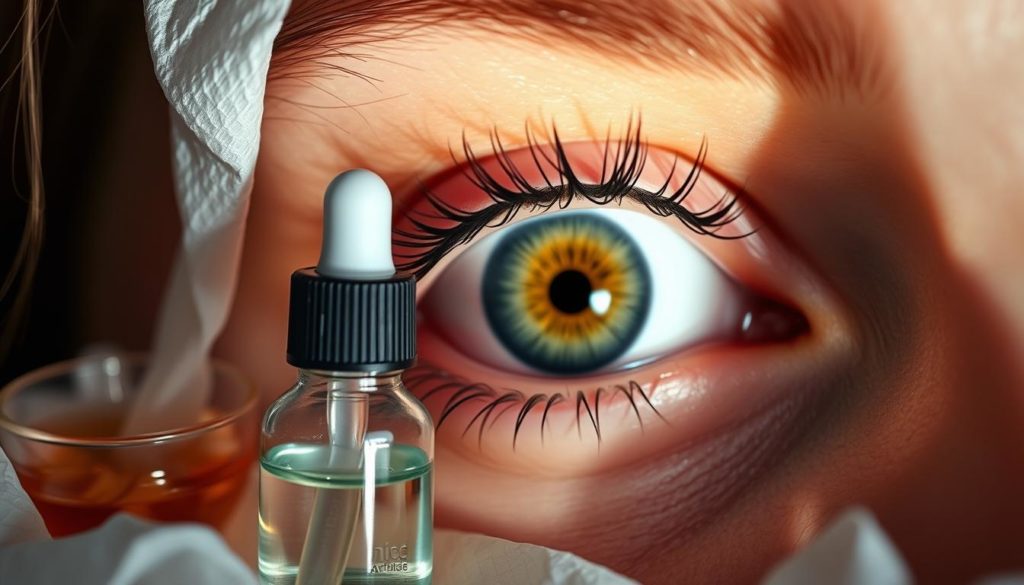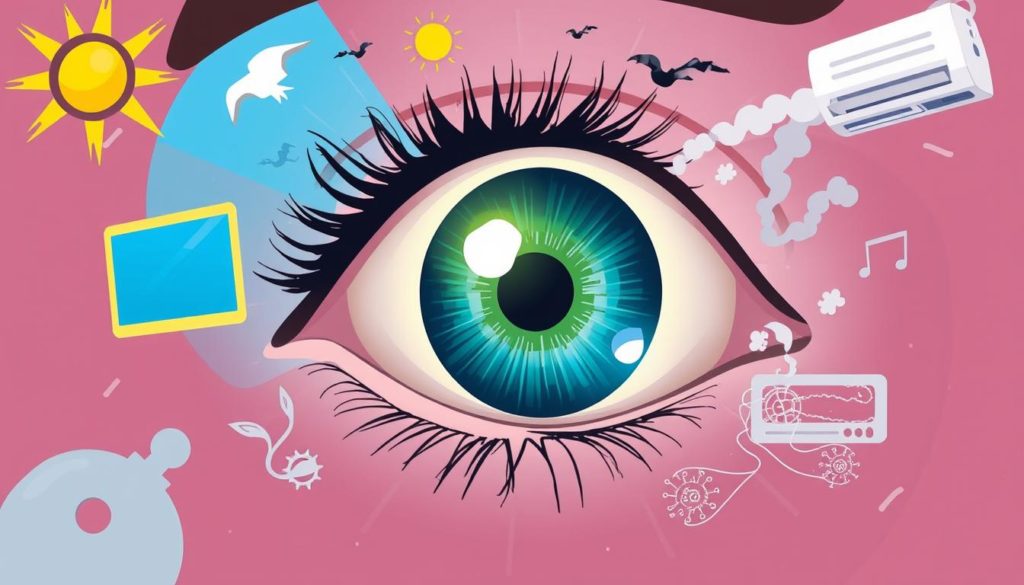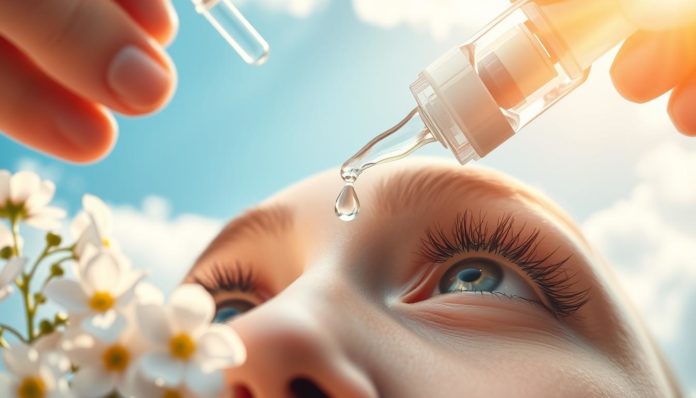Did you know over 16 million Americans have dry eye disease? It’s vital to spot dry eye symptoms early. Symptoms like burning, itching, or feeling something gritty in your eyes need attention. Getting help quickly is key to avoid more problems and feel better soon. Don’t delay – take action early!
Introduction to Dry Eye: Understanding the Condition
Dry eye is a common issue where not enough tears are produced, or they evaporate too fast. This problem affects the eye’s tear film, leading to discomfort. Knowing the causes of dry eyes helps in managing and preventing further issues. Eye care experts conduct thorough evaluations for an accurate diagnosis.
What is Dry Eye?
Dry eye happens when eyes don’t make enough tears, or the tears dry up too quickly. This situation messes up the protective tear film on the eye, causing discomfort and possible harm. It’s important to catch and treat dry eye early to protect your vision and comfort.
Common Symptoms
Typical signs of dry eye include feeling like your eyes are dry, itchy, or gritty. These signs, though they vary in how bad they feel, always suggest a need for an eye check-up and possible treatment. Finding and treating dry eye early is key to taking care of your eyes.

Common Causes of Dry Eye
Dry Eye Disease (DED) is common, especially in adults over 40. It’s important to know what causes dry eyes to help prevent it. Both lifestyle and environmental factors play a role.

Aging is a major cause. As we age, we produce fewer tears. This leads to less moisture in our eyes. People who wear contact lenses a lot may also suffer because it affects tear film. And, smoking can harm your eyes, causing tears to evaporate faster.
Health issues like diabetes can affect tear production too. High sugar levels lead to less eye lubrication. Being in areas with low humidity or wind can make things worse. Also, looking at screens for a long time reduces how often we blink. This dries out our eyes even more.
Understanding various chronic dry eye risk factors is key. These include:
- Aging
- Contact lens wear
- Smoking
- Diabetes
- Low humidity environments
- Extended exposure to video screens
Knowing these factors can help manage and reduce dry eye symptoms.
Recognizing the Early Symptoms of Dry Eye
Finding out early signs of dry eye can make your life better and stop worse symptoms later. Some early signs are key to look out for.
Feeling of Grittiness
If it feels like you have sand in your eyes, it could be early dry eye. This means your eyes might not be making enough tears. These tears help keep your eyes wet.
Burning Sensation
Feeling a burning in your eyes is another sign. This burning feeling could last all day. It might happen because of things like dry air or looking at screens too much.
Itchy Eyes
If your eyes are itchy a lot, it might mean dry eye. Eyes itch sometimes, but if it’s all the time, it’s not normal. Constantly itchy eyes could lead to more eye problems.
When to See a Doctor for Dry Eye
Do your eyes feel itchy, burn, or feel like there’s sand in them? These symptoms can really make day-to-day life hard. It’s key to spot these signs early and reach out to an eye care professional for help. Knowing when to see a doctor for dry eye matters a lot for the right care and to stop worse problems.
If you keep feeling these eye issues, it’s time to seek medical advice for dry eye. Chatting with an eye care professional will help figure out what’s causing it. They’ll show you how to fix it. Quick action means healthier eyes and a happier you.
- Recognize the Symptoms: Persistent irritation, burning, and grittiness.
- Impact on Daily Activities: Difficulty in performing everyday tasks.
- Consult an Expert: Seek medical advice from an eye care professional.
Don’t just ignore it if your eye problems get worse. Getting help early and seeing an eye care professional quickly can really change how you deal with dry eye.
Why Early Intervention is Crucial
Understanding the early treatment of dry eye is crucial for managing this common condition. By getting timely medical help, patients can dodge the severe effects of untreated dry eye on daily life. Symptoms like grittiness, burning, and itchy eyes can worsen if not treated early, highlighting the need for quick action.
Getting help early for dry eye can stop chronic inflammation, preventing more serious eye damage later. Early action helps save vision quality and avoids the need for harder treatments down the line. The main goal is to keep symptoms under control and make sure daily life isn’t affected.
To show how important timely treatment is, here’s a table comparing early and delayed treatment:
| Aspect | Early Treatment | Delayed Treatment |
|---|---|---|
| Symptom Severity | Mild to Moderate | Moderate to Severe |
| Vision Quality | Generally well-maintained | Often compromised |
| Treatment Approach | Simple, less invasive | Aggressive, multifaceted |
| Risk of Chronic Inflammation | Significantly reduced | High |
Clearly, starting dry eye treatment early has big benefits. It keeps eyes healthier for longer and cuts down on future problems. This means patients can have a better life quality.
Diagnosing Dry Eye: What to Expect
In diagnosing dry eye, expect a deep check to find the cause and how serious it is. A dry eye examination and tests will be done, along with a close look at your medical history.
Diagnostic Tests
There are many tests to understand your eye health completely. Here are some tests you might have:
- Tear Film Analysis: This checks the makeup and stability of your tear film.
- Schirmer’s Test: This test measures how many tears you make in a certain time.
- Tear Osmolarity Test: It looks at how salty your tears are, showing their osmolarity level.
- Evaluation of Blink Quality: This test sees how you blink and if it’s normal.
- Examination of Eyelid and Ocular Surface Inflammation: Checks for swelling that could affect tears.
Medical History Review
A big part of finding out if you have dry eye is looking at your medical past. This includes:
- Any eye surgeries or injuries before.
- Medicines you’re taking that might affect tears.
- Health issues like rheumatoid arthritis or diabetes.
- How much you’re around wind or dry air.
- If you’ve used contact lenses in the past.
By using these tests and learning about your health history, eye doctors can precisely figure out if you have dry eye. They can then create a treatment plan that fits you best.
Common Treatments for Dry Eye
Dealing with dry eye can be quite uncomfortable. Thankfully, there are many effective dry eye treatment options available. These include over-the-counter or prescription eye drops to keep the eye moist.
Doctors also suggest managing dry eye with lid massages and warm compresses. These methods help relieve symptoms.
Punctal plugs may also be recommended. These small devices are put in the tear ducts to stop tear drainage. This keeps the eyes more moisturized. It’s very important to listen to your doctor to find the best dry eye treatment options for you.
If you have other health issues causing dry eye, treating them can greatly assist. Always talk with a healthcare provider to make a treatment plan that’s right for you.
Advanced Treatment Options for Chronic Dry Eye
For those suffering from chronic dry eye, standard solutions may not be enough. Luckily, there are advanced treatments available. These can significantly improve this challenging condition.
Prescription Eye Drops
Prescription eye drops focus on the root causes of chronic dry eye. They can reduce inflammation or boost tear production. This offers better relief for those with tough symptoms. Brands like Restasis and Xiidra are made to enhance tear quality and amount.
Special Procedures
For severe dry eye, when typical treatments don’t work, special procedures might. These innovative methods include:
- LipiFlow Thermal Pulsation: This uses heat and pressure to open up meibomian glands, leading to healthier tears.
- Intense Pulsed Light (IPL) Therapy: Initially for skin, IPL also helps by lessening eyelid inflammation and aiding oil glands.
| Treatment | How It Works | Benefits |
|---|---|---|
| Restasis | Increases tear production | Long-lasting relief |
| Xiidra | Targets inflammation | Improves tear quality |
| LipiFlow | Heat and pressure therapy | Unblocks glands |
| IPL Therapy | Reduces inflammation | Better oil gland function |
Preventive Measures to Avoid Severe Dry Eye
To keep your eyes healthy, preventing severe dry eye is key. There are simple tips that can help a lot. Adding moisture to your air with a humidifier is an easy step.
It’s also important to stay away from smoke and manage how much time you spend looking at screens. Make sure to give your eyes breaks. Try looking at something far away every 20 minutes for 20 seconds.
- Maintain a humidified environment.
- Minimize exposure to irritants, such as cigarette smoke.
- Manage screen time and follow the 20-20-20 rule.
- Use adequate eye protection against environmental elements like wind and dust.
Wearing the right sunglasses outdoors is another big part of keeping your eyes moist and healthy. Choose sunglasses that protect you from wind and dust by covering more of your face.
| Preventive Measure | Benefit |
|---|---|
| Humidifier | Reduces tear evaporation |
| Avoiding Smoke | Lessens eye irritation |
| Screen Time Management | Prevents eye strain |
| Protective Eyewear | Shields eyes from environmental elements |
By being proactive, you can greatly reduce your chance of getting severe dry eye. These steps will keep your eyes feeling great. Embrace these practices to fight off dry eye disease.
The Role of an Eye Care Specialist
Dry Eye Disease (DED) can really affect your life. But the right diagnosis and treatment can change that. An eye care specialist has the know-how to check your eyes carefully. They use advanced tests to check your tear volume and quality.
Eye care specialists can give you different treatments. These include simple drops or even special blood serum drops and meds. They can do procedures like inserting punctal plugs, giving light therapy, and doing eyelid massages to help.
For more info, check out resources from respected places like the Mayo Clinic. They offer deep insights into these treatments.
An eye care specialist’s job also involves keeping an eye on your condition. They adjust your treatment as needed to keep you feeling good. They also offer tips on how to take care of your eyes and avoid problems in the future.
FAQ
What are common symptoms of dry eye?
If you feel like your eyes are itchy, burning, or dry, you might have dry eye. It can also feel like there’s sand in your eyes. If these symptoms keep happening, it’s important to get checked by a doctor for help.
What causes dry eyes?
Many things can cause dry eyes, including getting older and wearing contact lenses. Smoking, diabetes, and spending a lot of time in dry places or looking at screens can also cause it. These problems can make your eyes not make enough tears or make tears evaporate too fast.
What diagnostic tests are used for dry eye?
An eye specialist might do a bunch of tests to figure out if you have dry eye. They might look at your tears, how often you blink, and check for inflammation. They could also do a Schirmer’s test and measure tear osmolarity to know the dry eye type and severity.
What treatments are available for dry eye?
For dry eyes, you can use eye drops from the store or get a prescription. Doing lid massages, warm compresses, or using punctal plugs can also help. For tougher cases, there are special drops, LipiFlow treatment, or intense pulsed light therapy.
When should I see a doctor for dry eye?
See a doctor if you often feel burning or itchiness in your eyes, or like there’s sand in them. Getting help early is key to avoiding worse problems and getting the right treatment.
What are the benefits of early treatment for dry eye?
Getting help early can stop dry eye from getting worse. It can ease symptoms, keep your sight clear, and stop damage from inflammation. It’s crucial for managing the condition well.
What role does an eye care specialist play in managing dry eye?
Eye specialists are key in dealing with dry eye. They run tests, offer care, suggest treatments, and watch how the condition changes. Their help is vital for keeping your eyes healthy and easing symptoms.
How can I prevent severe dry eye?
To avoid bad dry eye, keep your places humid, stay away from smoke, manage how long you look at screens, and shield your eyes outside. These steps can lower your chances of getting severe dry eye.


